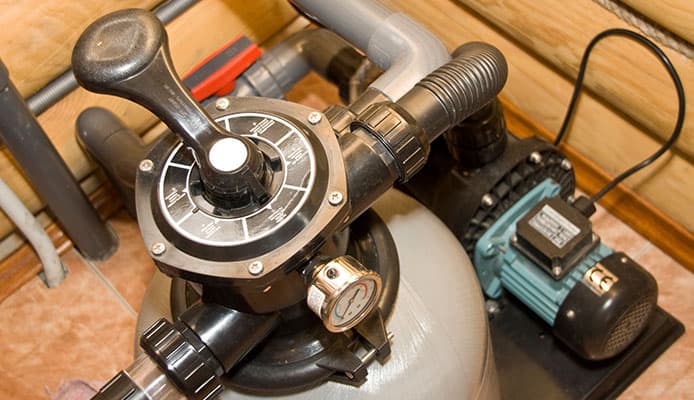
Once the summer days arrive, there’s nothing better than cooling off by swimming, together with your friends and family. But with all that fun, comes a responsibility to maintain the swimming surface regularly. During the procedure, a few key aspects are important to keep the pool clean, such as regulating the water chemicals and making sure that you are using a pool pump possible to sustain efficient results.
There are many reasons why you need to pick the best pool pump<span style=”font-weight: 400;”> since crucially, it will help to keep bacteria at bay and help to run the water through your filtration system. When deciding on which product to buy, there are many key aspects to consider.
In the following guide, we will run through those aspects to give you all the information that you need. We have also completed pool pump reviews to show you the best products on the market. By the end, you’ll have the confidence to pick the perfect one for your situation.
OUR TOP PICK
Hayward Super Speed
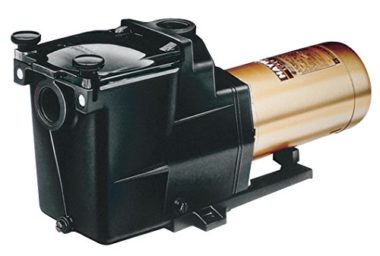
- Stand Out Features - Why We Love It
- Heavy-duty and high-performance motor
- Lets you see when the basket needs to be cleaned
- Includes swing-away hand knobs for easier strainer cover removal
Package Dimensions: 29.8 x 11.3 x 10.8 inches
Shipping Weight: 39 pounds
Power options: 12
EDITORS CHOICE
Pentair High-Performance
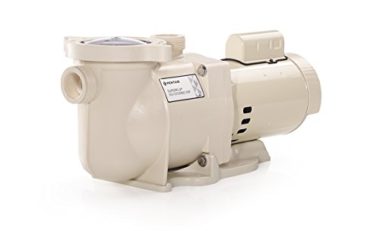
- Stand Out Features - Why We Love It
- Compatible with a control system
- A variable speed pump that is energy efficient
- Built-in diagnostics
Product Dimensions: 27.5 x 12.5 x 14.8 inches
Item Weight: 38.7 pounds
Voltage: 115/230 voltage
Power options: 6
BEST VALUE
Intex Krystal Clear Filter
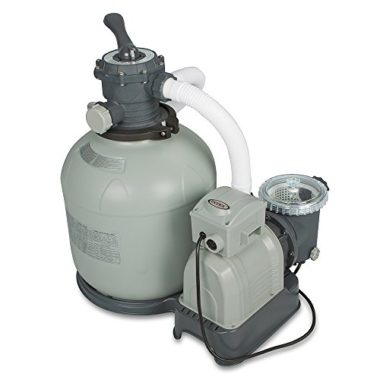
- Stand Out Features - Why We Love It
- Designed for above-ground pools
- Works with 110-120 volts to save you some money
- Low maintenance
Product Dimensions: 27.1 x 17.6 x 25.5 inches
Item Weight: 40.9 pounds
Flow rate: 2800 gallons per hour
Tank size: 6″
Hayward Power-Flo LX
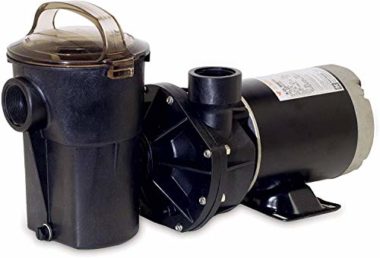
- Stand Out Features - Why We Love It
- 100% drip-proof with a heat resistant seal
- Made with a design that will allow you to see when the basket should be cleaned
- Very easy maintenance
Product Dimensions: 8.5 x 10 x 22.5 inches
Item Weight: 4 ounces
Horsepower: 1-1.5
Voltage: 120V
Pentair Tan Variable Speed
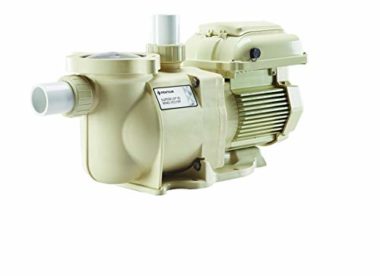
- Stand Out Features - Why We Love It
- Variable speed pump options
- Energy efficient with a validated energy star
- Ultra-quiet performance
- Easy to install
Product Dimensions: 28 x 15.5 x 12.5 inches
Item Weight: 52 pounds
Horsepower: 1.5
Voltage: 230V
Harris ProForce
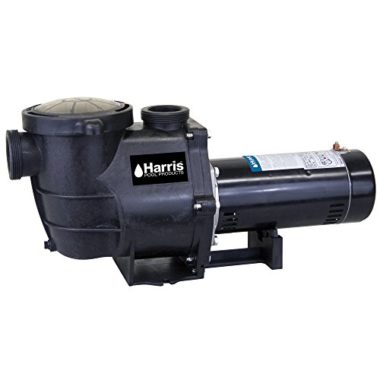
- Stand Out Features - Why We Love It
- Designed for above-ground
- 1.5-HP motor for extra power and speed
- 115 volts to save you on electricity
Product Dimensions: 22 x 8 x 10.8 inches
Item weight: 22 pounds
Voltage: 115 volts
Horsepower: 1.5 HP
XtremepowerUS High-Flo Swimming
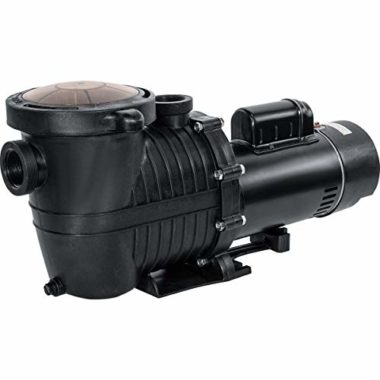
- Stand Out Features - Why We Love It
- High-performance motor with airflow ventilation for quieter noise and smoother run time
- Self-priming pump that discharges air from water intake to prevent the motor from running dry
- Enclosed impeller fan with wide openings to prevent clogging by leaves and debris
Product Dimensions: 25.6 x 13.8 x 10.2 inches
Item weight: 30.9 pounds
Voltage: 230
Horsepower: 1.5 HP
XtremepowerUS Sand Filter Above Ground
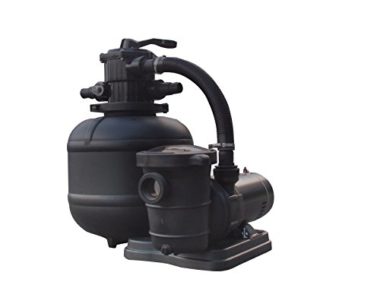
- Stand Out Features - Why We Love It
- Designed for all the above-ground pools
- Sand filtration mechanism included
- 115V needed for electricity savings
Product Dimensions: 21 x 25 x 29 inches
Pump Power: 1.5HP
Voltage: 115V/60Hz
Flow Max: 4,500GPH
Hayward PowerFlo Dual-Speed
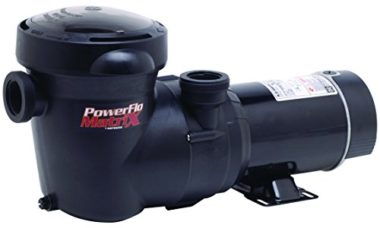
- Stand Out Features - Why We Love It
- High-performance impeller with a wide opening
- Dual-speed options
- 1.5-HP
Product Dimensions: 9.5 x 23 x 11 inches
Pump Power: 1.5HP
Voltage: 115V
Size options: 2
In The Swim
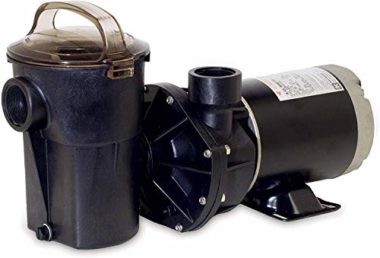
- Stand Out Features - Why We Love It
- 1 horsepower to provide maximum speed without extra energy needed
- High-performance pump that comes with replacement O-rings
- 120V to save up electricity
Product Dimensions: 22 x 11 x 9 inches
Item Weight: 22.5 pounds
Pump Power: 1 HP
Voltage: 120V
How To Choose A Pool Pump – Buying Guide
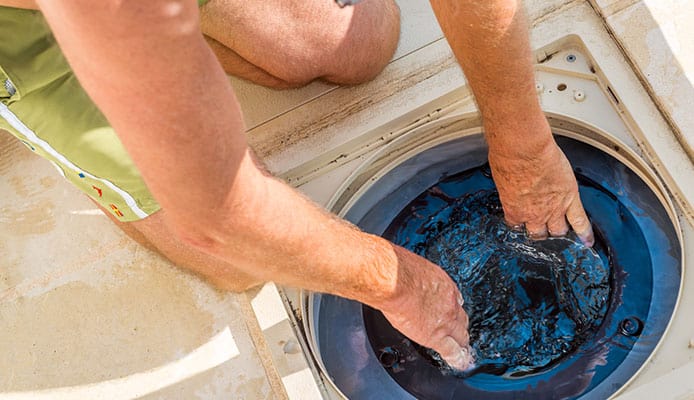
Speed required
The speed of your pool pump will be dictated by the needs of your pool. It will also be affected by the size of your pool. There are three options when it comes to speed: single-speed pool pump, dual-speed, and variable speed pool pump. Each speed of the pump has benefits and disadvantages, and each offers varying features.
- Single-speed: only runs at a single speed. Made to use more power than lower speeds, which means that you will spend more money on energy. Such money may be worth it, though, as it will effectively filter your pool constantly. They are also easier to take care of. If you are well versed in pool maintenance, then you may be better with a different type of pool water pump as they will save you money in the long-run, but if you want something which can take care of itself, then a single-speed pool pump is the way to go.
- Dual-speed pump: gives you the option of high speed and low speed. Using the high-speed option is the same as running a single-speed pool pump. The lower speed gives you an option that will save you some money. As there are more options, the dual-speed pump needs a little more maintenance than the single speed pool pump.
- A variable-speed pool pump: will cost you more to buy but will save you a lot more money in the long run. The variable-speed magnetic motor costs you less to run, and there are a variety of speeds instead of having only one or two. With a very high speed, you can filter the water extremely quickly.
- Low-speed pump: does not need a lot of power and can maintain your pool after filtering. The pool pump will cost more to maintain, and repairs could cost a lot more than a single-speed pump, but if you take care of your pool pump, then you will not have any problems with it.
Size of Your Pool
You do not need to buy a top-rated swimming pool pump that is designed for a much larger pool as you will only be wasting your money. A larger pump does not mean that it will filter the water quicker or better, it only means that it will be capable of handling more volume of water.
If you buy the right size pump, then the water will be filtered correctly. The opposite goes for a pool pump which is too small. You may want to save some money, and buy a smaller pump, but if it is not rated for your pool, then it will not be able to filter all of the water, and your pool water will become contaminated. You should always try to find an option that fits your pool or is slightly larger.
If you buy a bigger pool pump than needed, then not only will you be spending more money initially, but you will also be spending more money each month than you need to. With a smaller pump, you will spend less initially, and less each month, but you will not be filtering your pool water, and the water can become dangerous.
To find the size of the pool pump you need, you first need to know the number of gallons in your pool. You may already know this, but if not, then you can find the information in the user guide or online. To get the needed flow rate, you need to take the total number of gallons in your pool and divide it by eight.
Most pool pumps are rated in terms of gallons per minute. To get the right pool pump, take your flow rate, and divide it by sixty. This will give you the rate per minute. From this number, you can choose the correct pool pumps.
Above Ground or In-Ground Pool
They come as either above ground or in-ground, but this does not necessarily mean that this correlates with an above ground pool and an in-ground pool. It may be that an inground pool pump will be easier to install with an in-ground pool, and an above-ground pump will be easier to install with an above ground pool, but you do not need to do this.
Both types of pool pumps can be installed with both types of pools. There are differences between the two types of pool pumps, which you should definitely know about, but you do not necessarily need to choose only one type.
In-ground pool pumps are self-priming. Above ground, pool pumps are not. So, what does this mean? In-ground pumps are lower down and need more power to lift the water. Above ground, pumps can rely more on gravity to add to the pressure of the water.
You will use slightly more power with an in-ground pool pump. The difference in level between the pump and the surface or the water will dictate how hard the pump has to work.
In-ground pool pumps will generally have a higher flow rate. When you are choosing the flow rate for your pool, you need to make sure that you get it right so that you are able to filter all of the water in your pool, but you are not wasting energy doing so. For pools that require a large flow rate, you will be more likely to choose an in-ground pump.
Plug-In or Hardwired
The main thing you need to look at when you are providing power to your swimming pool pump is the voltage. There is no point in choosing between hardwired plug-ins before you know the power needs. Some pool pumps will require a higher voltage than your regular sockets, and you may have to run a special line to your pump. If this is the case, then you will need to plan ahead before you go ahead and buy one.
Once you have determined the voltage and whether or not you can supply it, you should look at plug-in vs. hardwired. Your pool pump may need one or the other. Either way, you will need to ensure that there is a power supply that can run to your pool. You may need to wire a socket right by your pool, or you may need to run a cable from your pump to your fuse box.
Horsepower
When you are chasing your horsepower, you should make sure that you have enough voltage to run it. If you do not have the voltage for the horsepower, then your pump will be useless. There is also no point in having a high horsepower pump if you are not going to need all of that power. If you are wasting energy in powering your pump, then you may as well throw your money down the drain. Also, you might want to consider buying a pump with an already gained energy star.
You also do not want to waste energy. A pool pump that is too high horsepower can also damage your filtration system and any other accessories attached to it. If you are pumping it through at too high a rate, a filter or heater may not be able to deal with it, and you may end up damaging your pool equipment.
You might also like: How To Clean Pool Filter Cartridge Easy
Motor Voltage
The voltage is important when you come to buy your pump. Most pool pumps will use 110 volts or 220 volts. You may have one or the other, or you may have both. If you have both close to your pool, then you do not need to worry about what type you buy, but if you do not have one, then you have to be pickier.
Of course, you can always hook up power to your fuse box if you have the room. You should not let the voltage put you off buying the option you want, but if you cannot supply a certain voltage, then some pool pumps will be off-limits to you.
FAQs
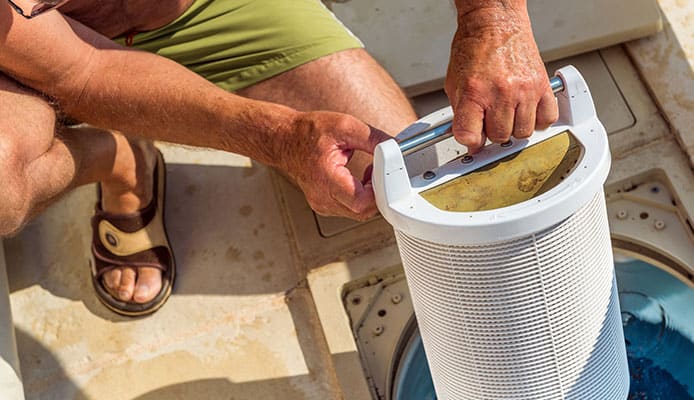
Q: How does a pool pump work?
The pump is essentially the heart of the swimming pool's circulation system and it works by pulling the water from the pool through the skimmer and main drain, pushing it through the filter, and returning it to the pool through the main returns. The pump itself consists of three components: The motor, impeller, and hair and lint trap.
The main purpose of the pump is to take the water from your pool, draw it through the main drain, pool skimmer, and pool filter, and then pump it back out into your pool. When you combine it with a heating system, you have everything you need to take care of your pool and keep it heated.
Without one in your pool, the water will begin to stagnate, and algae can start to grow. Germs and bacteria will also grow in your pool. It does not take long for a pool to become unsafe for people to be in it. If someone touches it, then they can get an infection or a rash, but they could have a worse reaction if they swallow the water.
Q: What Is The Difference Between Above Ground And In-Ground Pool Pumps?
The main difference between in-ground and above ground pool pumps is that in-ground pumps are “self-priming”, and above-ground pumps are not. Such a thing refers to the ability of the pump to lift the water vertically, since most in-ground pumps are located above the pool level, and most above-ground pumps are situated below the pool level. With an above ground pool pump, you also get a high flow. The higher flow means that the cycle runs quicker and you get more filtered out in less time.
An in-ground one is cheaper than an above-ground. These pumps are even easier to use than the above-ground pumps. These two reasons make in-ground pumps attractive options, but you also need to add the fact that in-ground pool pumps use more energy, so you will have to spend more money over time running the pump.
Q: What Is The Difference Between Single-Speed, Dual-Speed, And Variable Speed Pool Pumps?
The difference between the two is that variable speed pumps allow you to adjust the flow rate of water through the circulation system, while single speed pumps only have one speed. As you can see, the energy cost is almost identical; however, the variable speed pump turns it over more than twice as often.
When you are shopping for such a pump, you need to look at all of your options and make sure that you are fitting your needs. Shopping around a little will save you money initially and in the long run. Take a look at our list and find one of the best pumps on the market.
Q: Can a pool pump be too big?
Yes. Some pumps may be too big for your pool. And when it comes to pool pumps - the bigger doesn't mean the better. There is a very persistent myth in the pool world that the higher the horsepower, the better. As a result, it is probably safe to say that the majority of pools have oversized pumps. Too large of a pump can cause poor filter performance and even damage it if the filter is not also oversized accordingly.
Q: Should the pool pump run continuously?
Although it's generally recommended that all the pool water undergo filtration every 24 hours, the pump does not need to run all the time. If your pool is in constant use, you may need to run the pump for up to eight hours per day, frequently checking the clarity and chemical balance.
Globo Surf Overview
Unless you are refilling a pool every day, you need a pool pump. Keeping that water movement is essential for a number of reasons as we have seen. There is a lot to consider but with the information provided here, you’ll be able to make the best choice.
Our buying guide explains everything to you, and our list highlights the features of the ten pool pumps on the market. Take the time to know what you need, and save yourself time and money with the best pump.

